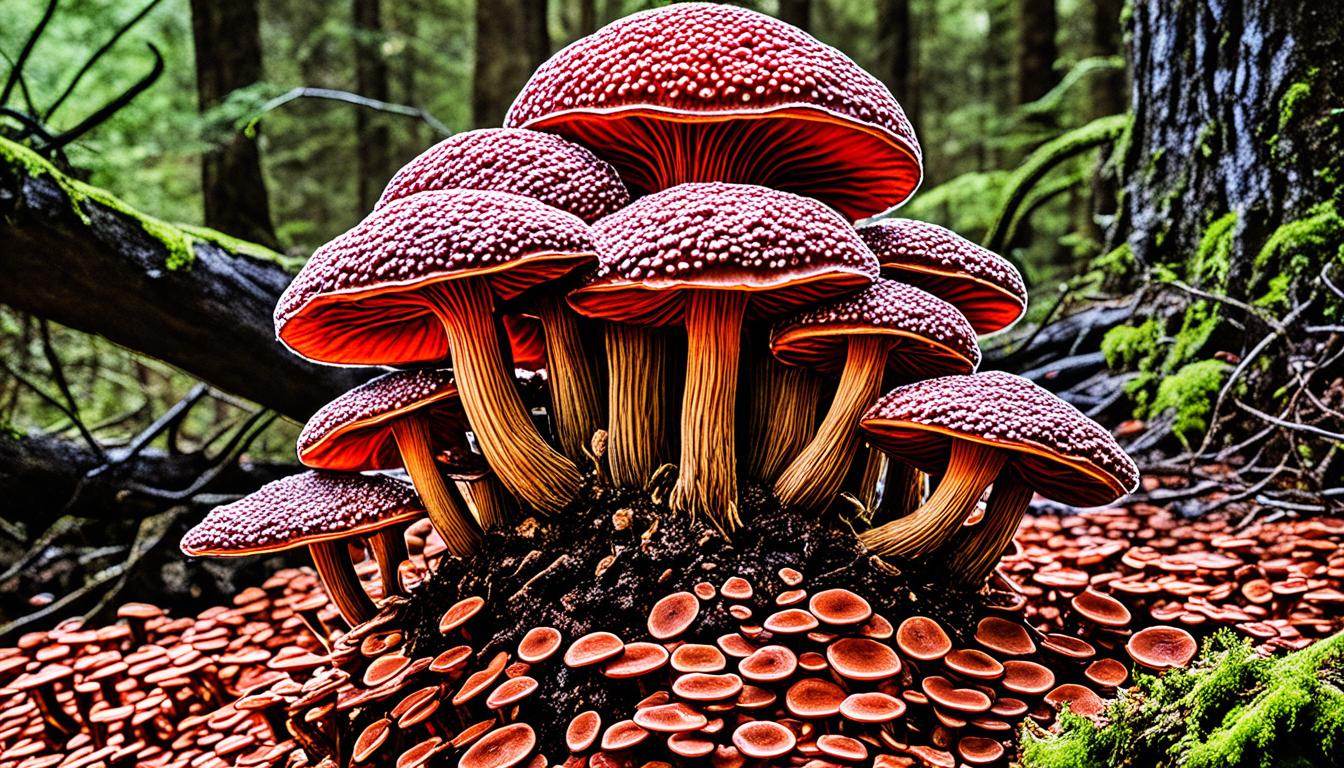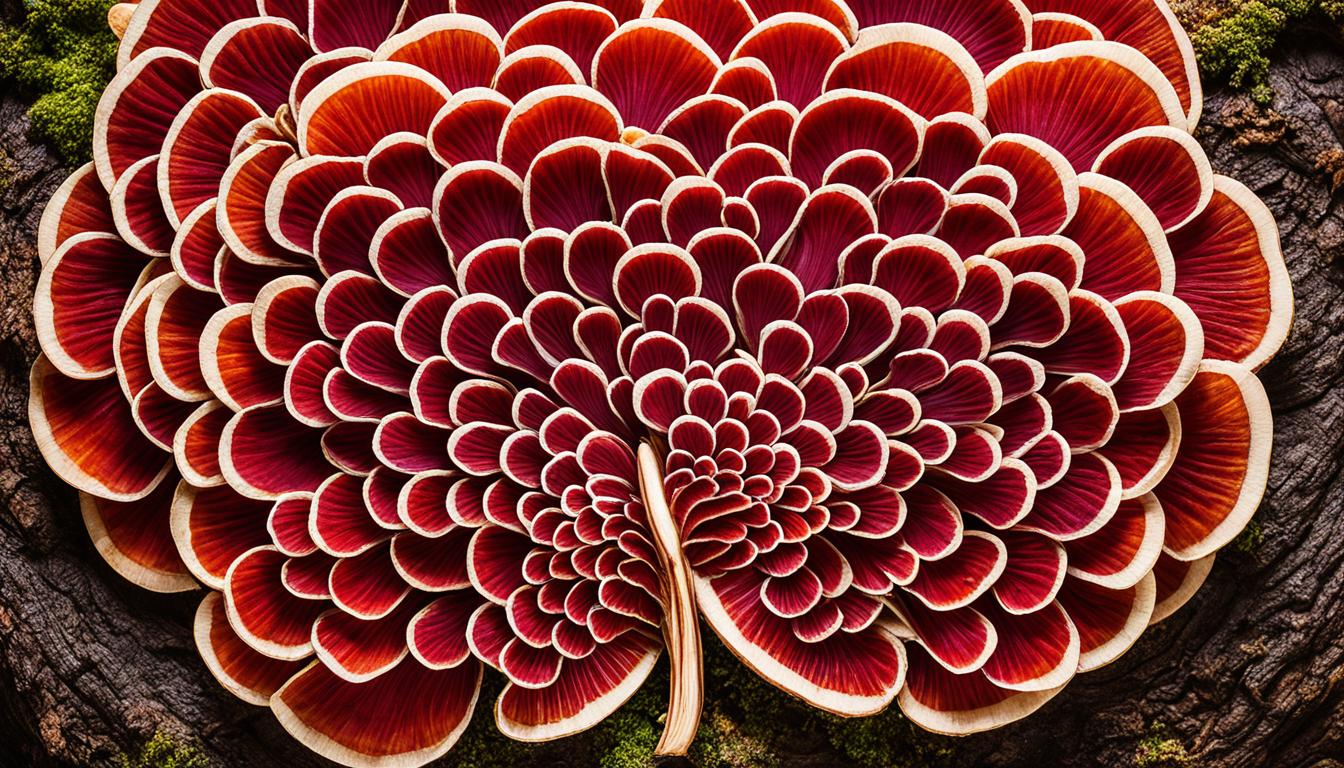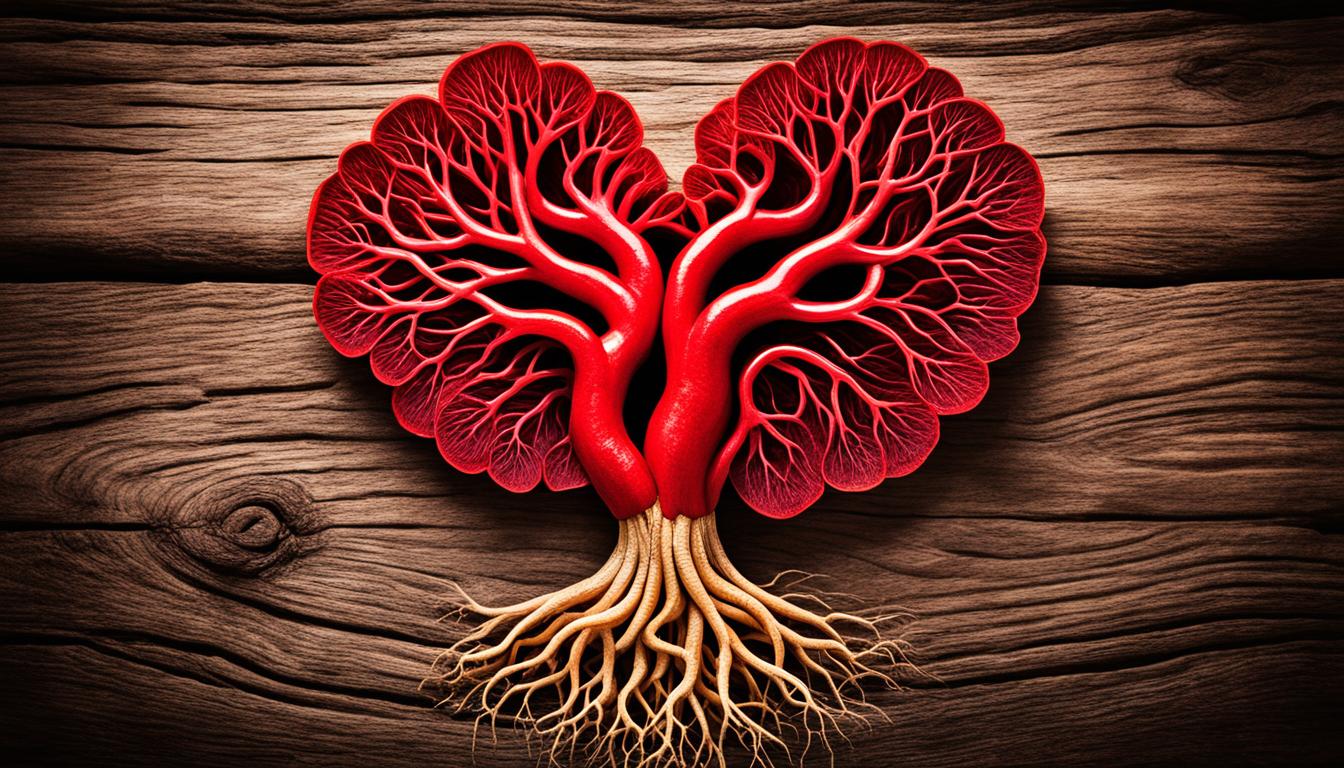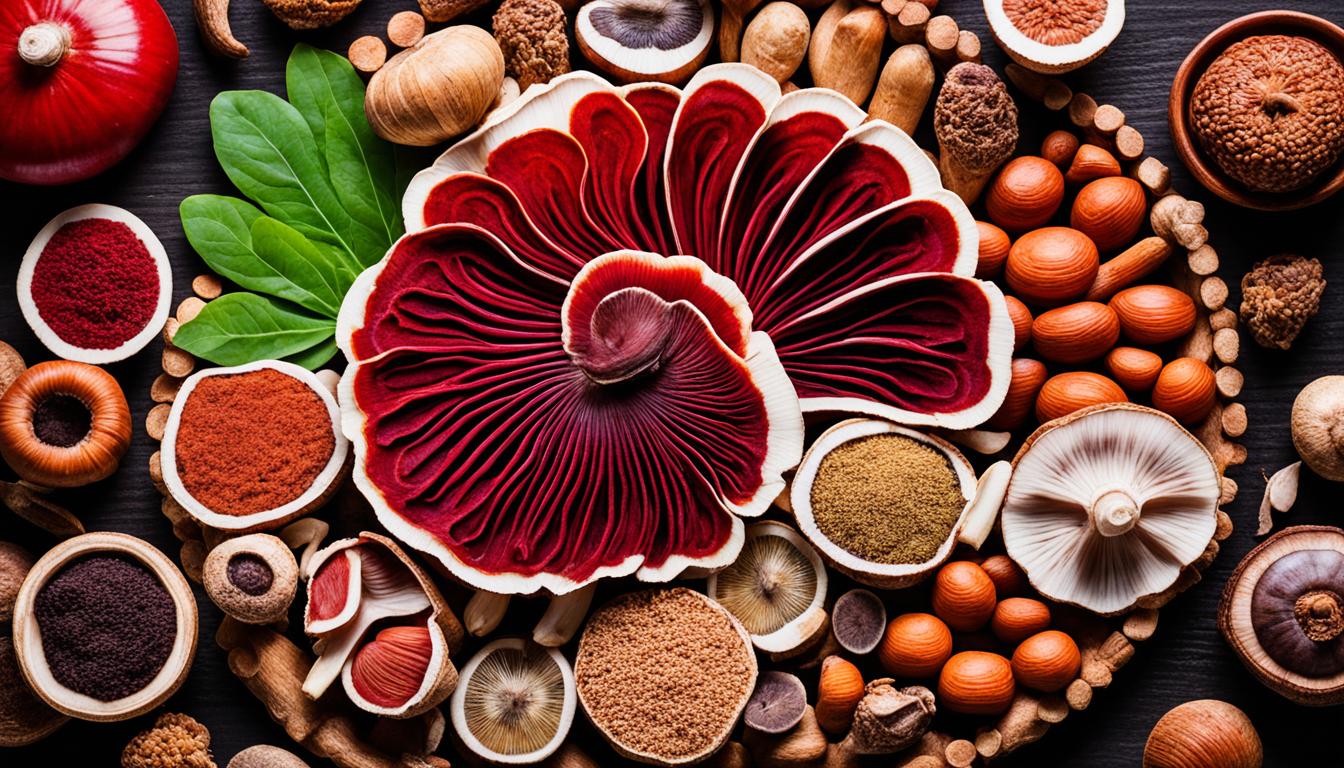Health
The Health Benefits of Reishi Mushroom
In the lush landscapes of Asia, the Ganoderma lucidum, known as reishi mushroom, garners 81% approval for its immune-boosting capabilities. It stands as a pillar of longevity and health, inspired by age-old wisdom yet fascinating to contemporary science. This fusion has thrust its Eastern medicinal heritage into the limelight worldwide. The journey to uncovering the benefits of Ganoderma lucidum moves past mere tradition, as it draws scientific interest in its potential to enhance life quality.
Key Takeaways
- Reishi mushrooms are acclaimed for enhancing the immune system, potentially keeping health check-ups at bay.
- Ganoderma lucidum may contribute to your vitality by potentially aiding in tumour size reduction.
- The intersection of natural health paths and modern research reaffirms the significance of reishi mushrooms.
- Despite the myriad potential benefits, the need for more robust scientific evidence urges mindful consideration.
- Embrace the full spectrum of reishi mushroom advantages, all the while being cognisant of its contentious safety profile.
- With ongoing research, the true extent of Ganoderma lucidum’s integrative benefits is poised to unfold.
Understanding Reishi Mushroom: A Traditional Medicine Staple
Traditional Chinese medicine profoundly reveres the reishi mushroom, immortalised as a symbol of longevity and robust health. This “mushroom of immortality” integrates centuries-old Asian wellness traditions, delivering substantial health benefits. Its enduring use is corroborated by ancient texts, underscoring its vital role among medicinal mushrooms.
In Japan and China, reishi mushrooms seamlessly blend into daily health regimens and cancer therapy adjuncts. This integration, supported by decades of application, signifies a profound confidence in its therapeutic powers.
Reishi’s therapeutic scope within traditional Chinese medicine is broad, addressing everything from minor infections to complex pulmonary conditions. Ongoing research illuminates its potential in oncology, further cementing its importance.
The marriage of ancient wisdom and current scientific endorsement renders reishi mushrooms a compelling topic in wellness enhancement explorations. They represent a bridge between the time-honoured healing techniques of Eastern medicine and the adjunctive strategies of modern healthcare, proposing a distinctive, natural avenue for health improvement.
- Historical Evidence: Reishi’s longstanding nexus with health and longevity.
- Modern Acceptance: Today’s application of reishi mushrooms in Eastern medicine is scrutinised.
- Medicinal Mushrooms: Exploring how fungi such as reishi advance healthcare.
- Clinical Application: Delve into reishi mushroom’s sanctioned role in cancer treatment protocols.
The reishi mushroom maintains its stature within traditional Chinese medicine as we navigate the confluence of ancient practice and modern science. It symbolises a timeless promise for health and longevity, resonating across generations.
Reishi Mushroom’s Impact on Immune System Health
Discoveries in natural health spotlight the influence of specific nutrients on our physiology. The Reishi mushroom stands out in traditional medicinal circles for its immune support capabilities. Acknowledged for enhancing health, it is known to regulate white blood cell production and demonstrate anti-inflammatory properties. These traits are critical for sustaining a potent immune defense.
White Blood Cell Stimulation
The immune system’s health hinges on various cells, with white blood cells playing a pivotal role. Reishi mushrooms are believed to boost these vital cells, aiding those facing illness or stress. Scholars are meticulously researching Reishi’s potential to activate the body’s defense systems. This activation prompts a rise in white blood cell production, offering support for recovery and enhanced immunity.

Inflammation Pathways and Their Alteration
Inflammation serves as the body’s instinctive reaction to harm or infection, yet it can linger and cause numerous complications. Reishi mushroom’s anti-inflammatory effects are becoming increasingly recognized. This recognition stems from studies indicating Reishi’s ability to modify inflammation pathways. Incorporating Reishi mushrooms into diets or as supplements could assist in the battle against persistent inflammation.
The ongoing investigation of Reishi mushrooms for immune enhancement is revealing a broader scope of their possibilities. While these mushrooms have been esteemed in traditional practices for ages, modern scientific exploration is crucial. This exploration aims to decipher and quantify Reishi’s benefits, confirming its role in contemporary health routines.
The Role of Reishi Mushroom in Cancer Therapy
Exploring Reishi mushrooms unveils their potential as a supplemental cancer therapy. Their longstanding usage in Eastern medicine and modern scientific studies indicate a possible beneficial role. These mushrooms are recognized for anticancer properties, enhancing the effectiveness of conventional treatments. This suggests an innovative, integrative approach to cancer management.

Potential Anticancer Properties
Test-tube studies underscore Reishi mushroom’s capability to diminish tumor size, interrupting the proliferation of cancer cells. It has been discovered that Reishi compounds initiate apoptosis, a vital process in cancer treatment. This evidence positions Reishi mushrooms as potentially influential in developing future cancer therapies.
Reishi’s Synergy with Traditional Cancer Treatments
Reishi mushrooms exhibit benefits beyond direct anticancer effects, serving as a supportive supplement in cancer treatment. Evidence indicates their use with standard therapies may boost the immune system’s response to cancer. This is achieved by enhancing white blood cell function, critical for the success of traditional treatments.
This blend of ancient natural remedies and contemporary science fosters a promising cancer treatment adjunct. Ongoing research is likely to expand our understanding of Reishi mushrooms, potentially altering the standard of cancer care. This presents a new hope in the fight against cancer, aiming to better patient outcomes.
Alleviating Mental Health Issues: Reishi Mushroom’s Benefits
In our fast-paced lives, a reliable stress relief strategy becomes indispensable. Reishi mushrooms have been utilized in traditional healing practices for centuries. Today, they are entering the dialogue on natural mental well-being enhancements. These fungi, distinguished by red caps and a glossy surface, may serve as a relaxation aid, offering solace amidst the psychological demands of contemporary existence.

Contemporary natural health research is spotlighting reishi mushrooms’ potential in mental health care. Preliminary data suggest that these mushrooms positively affect emotional equilibrium and induce serenity. The intrinsic compounds discovered through research could be instrumental in mitigating symptoms associated with anxiety and depression.
Yet, when considering reishi mushrooms for stress relief, proceed with caution and informed judgement. The empirical support for their use, while growing, necessitates further research to affirm reishi’s efficacy as a relaxation aid. Note that natural therapy reactions differ among individuals, emphasizing the value of personal experiences with reishi mushrooms in appreciating their contribution to mental well-being.
“Reishi mushrooms have been associated with a serene state of mind, but as with any natural remedy, personal experiences and scientific research together pave the way for their acceptance in mental health practices.”
Contemplating adding reishi mushrooms to your self-care plan? Keep abreast of new research validating these age-old practices for addressing contemporary mental health issues. Being well-informed facilitates your journey towards achieving mental balance and tranquility.
Reishi Mushroom’s Effects on Fatigue and Depression
The relentless pursuit of holistic remedies for fatigue and depression has led to Reishi mushrooms. These ancient fungi have evolved beyond traditional medicine, offering a glimmer of hope for those battling weariness and emotional despair. Investigating the connection highlights Reishi’s notable capacity for enhancing well-being.

Studies on Reishi Mushroom and Neurasthenia
Neurasthenia manifests as chronic fatigue and pain, ensnaring sufferers in endless exhaustion. Research suggests Reishi mushrooms’ bioactive compounds significantly decrease fatigue. This insight beckons further exploration into their potential for alleviating persistent symptoms.
The Impact on Quality of Life for Cancer Patients
The journey through cancer treatment emphasizes the importance of quality of life enhancements. Observations point to Reishi mushrooms offering relief from fatigue and depressive states during such trials. They emerge as a promising adjunct to traditional treatments, aiming to elevate the spirits and physical condition of patients.
| Aspect of Life | Without Reishi | With Reishi |
|---|---|---|
| Energy Levels | Often Low | Noticeable Improvement |
| Mental Clarity | Foggy, Unclear | Enhanced Clarity |
| Emotional Well-being | Depressive Symptoms | Alleviation of Symptoms |
| Social Interaction | Reduced Engagement | Increased Social Activity |
| Overall Well-being | Oftentimes Compromised | Significant Improvement |
Incorporating Reishi mushrooms into your healthcare approach might significantly enhance your condition. It serves as an adjunct therapy for depression or as a supportive measure in cancer treatment. This natural solution proposes a pathway to rejuvenate and rebalance your existence.
Exploring the Antioxidant Powers of Reishi Mushroom
In the fascinating realm of Reishi mushrooms, one discovers a potential wealth of naturally occurring antioxidants. These compounds are celebrated for their capacity to shield cells from damage and combat oxidative stress. They aim to protect our cells against free radicals, which are notorious for causing oxidative harm. This harm is a nefarious process associated with chronic illnesses and the aging phenomenon.

The efficacy of Reishi mushrooms in notably enhancing antioxidant enzyme levels remains a topic of discussion among researchers. While some investigations suggest a boost in antioxidants, others reveal negligible changes. To clarify, let us evaluate the existing evidence regarding Reishi mushrooms as an antioxidant reservoir:
| Antioxidant Component | Effectiveness | Notable Research Findings |
|---|---|---|
| Polysaccharides | Moderately Effective | Some studies observed increased antioxidant activity in subjects |
| Beta-glucans | Varied Results | Outcomes vary, necessitating further investigation |
| Triterpenes | Potentially Effective | Associated with reduced oxidative stress, though more proof is needed |
| Overall Antioxidant Status | Inconclusive | Extant research does not confirm a significant effect |
The endeavor to definitively establish Reishi mushroom’s antioxidant prowess continues, fueled by enduring hope and interest. This is due to its long history of use and modern anecdotal evidence of health benefits. Incorporating Reishi mushrooms into diets, with an understanding of their potential for cellular protection, remains a judicious option for those combating oxidative stress. Nonetheless, it is paramount to adhere to the latest research and seek advice from healthcare professionals concerning individual health requisites.
Reishi Mushroom and Cardiovascular Wellbeing
Delving into reishi mushrooms’ potential impact on cardiovascular health reveals its significance in contemporary wellness discussions. Those aiming to enhance heart health, manage cholesterol levels, and regulate blood sugar might find reishi mushrooms beneficial. Recognizing the value of such natural supplements can be crucial.

Research on Blood Lipids and Cholesterol Levels
Cardiovascular research sheds light on reishi mushrooms’ promising role in heart health preservation. These studies suggest the mushrooms’ capacity to improve blood lipid profiles, enhancing HDL cholesterol and reducing harmful triglycerides.
This balance is crucial in preventing heart disease, showcasing reishi mushrooms as a valuable tool in cholesterol management.
Reishi Mushroom’s Influence on Blood Sugar Control
The capacity of reishi mushrooms to regulate blood sugar levels represents another advantage. Evidence suggests their consumption could assist in reducing blood sugar, beneficial for managing diabetes or pre-diabetic states.
| Benefit | Result from Studies | Impact on Heart Health |
|---|---|---|
| Blood Sugar Levels | Reduction shown in some studies | May lower the risk of diabetes-related cardiovascular issues |
| HDL Cholesterol | Increase in ‘good’ cholesterol observed | Promotes cleaner blood vessels, reducing heart disease risk |
| Triglycerides | Decrease in levels found in research | Lower levels are linked to reduced risk of atherosclerosis |
Promising research outcomes advocate for deeper exploration into reishi mushroom’s broader cardiovascular benefits. As investigations progress, the standing of reishi mushrooms in cardiac health care is poised to enhance, signifying a natural complement to established medicinal practices.
Nutritional Composition and Bioactive Compounds in Reishi Mushroom
The exploration into reishi mushrooms uncovers a profound array of bioactive components primed to enhance one’s health. Among these, beta-glucan stands out, celebrated for its ability to fortify the immune system. It aids in augmenting white blood cells, which are crucial in fending off infections.

The fiber in reishi mushrooms also advances digestive wellbeing, positioning it as a multifaceted nutritional ally. Analyzing a sample of reishi mushroom powder, one finds it’s low in calories yet rich in dietary fiber. This highlights its substantial nutritional merit, all while keeping caloric intake modest.
Yet, the value of reishi mushrooms extends beyond mere beta-glucan and fiber. They harbor a spectrum of micronutrients, each vital for sustaining different physiological processes. The richness and natural occurrence of these nutrients within reishi mushrooms render them a prized component for a health-centric diet.
Adopting reishi mushroom into one’s diet transcends basic nutritional enhancement; it signifies a commitment to enriching health with a revered natural element. Embracing the adage, ‘Let food be thy medicine,’ reishi mushrooms embody this principle profoundly.
The Reishi Mushroom: An Ancient Solution for Modern Stress Reduction
In our fast-paced existence, fraught with mental and environmental stressors, the importance of finding effective anxiety relief methods cannot be overstated. The adaptogens within reishi mushrooms stand out as a promising solution for individuals searching for natural ways to ease contemporary life’s demands. These fungi, rich in history and supported by modern research, offer a plethora of triterpenes and polysaccharides. These compounds are acclaimed for their soothing effects on the nervous system.
Considering the stress-relieving potential these natural elements offer, it’s worth examining how reishi mushrooms could enhance your wellness practices to achieve profound relaxation and sharper mental focus.
| Adaptogens in Reishi | Benefits for Stress | Impact on Anxiety |
|---|---|---|
| Triterpenes | May decrease cortisol levels, ameliorating stress | Contributes to a calm state, lessening feelings of anxiety |
| Polysaccharides | Supports adrenal gland function for stress resilience | Enhances mood regulation, potentially reducing anxiety symptoms |
Exploring the possibilities for enhanced anxiety management, incorporating reishi mushrooms into your daily health routine might be crucial. This approach helps in coping with the stresses of modern life. Available in various forms such as tea, supplement, or extract, they offer a path to serenity. This highlights how time-honored solutions are being revived to support current wellness practices.
Remember, always consult a healthcare provider before starting any dietary supplement. This ensures compatibility with your health conditions and medications, facilitating a safe journey towards stress alleviation and improved mental well-being.
Incorporating Reishi Mushroom into Your Diet
Integrating beneficial fungi, such as the reishi mushroom, into your nutrition regimen could pave the way to enhanced health. This mushroom has been coveted for centuries due to its potential medicinal effects, offering a spectrum of benefits including wellbeing enhancement and possible immune support. The challenge lies in fitting this ancient remedy into the fabric of modern lifestyles. This exploration delves into dietary inclusion methodologies, alongside unveiling user-friendly reishi recipes, facilitating the integration of this formidable mushroom’s advantages effortlessly.
Different Forms of Reishi Mushroom Consumption
When deliberating over supplement choices, it’s crucial to note that reishi mushrooms possess a denser texture and inherent bitterness. Consequently, they’re frequently enjoyed in modified forms to enhance their palate appeal and ease of inclusion in daily diets. Presented here are varied versions of dietary reishi:
- Herbal Teas: Soaking dried reishi pieces in hot water produces a healthful tea.
- Powders: Ground reishi can be added to smoothies or meals for an easy health boost.
- Capsules: For those on the go, reishi capsules offer a quick and convenient supplement option.
- Extracts: Concentrated forms of reishi are available in liquid extracts for direct consumption or addition to recipes.
Creating Palatable Reishi Mushroom Recipes
Converting reishi mushrooms into appetizing creations promises culinary adventure. Whether aiming for a gentle infusion or the spotlight in your dishes, the forthcoming reishi recipes are accessible for culinary beginners, simultaneously enhancing the dietary inclusion of this revered mushroom:
- Reishi Tea Latte: Begin by brewing reishi powder with your choice of milk, sweeten to taste, and finish with a sprinkle of cinnamon.
- Reishi Vegetable Soup: Simmer vegetables with reishi extract in a hearty broth for a nourishing meal.
- Reishi Smoothie Bowl: Blend your favourite fruits with reishi powder, pour it into a bowl, and top with nuts and seeds for a balanced breakfast.
- Reishi Chocolate Truffles: Mix reishi powder into your chocolate truffle mixture for a decadent yet healthful treat.
Spreading these supplement choices throughout different meals daily ensures the health benefits of reishi mushrooms are uniformly consumed. Moreover, it introduces a dietary variety, keeping your palate intrigued. Unveiling the culinary adaptability of reishi mushrooms from morning smoothies to nighttime beverages is crucial to harnessing its full potential.
Reishi Mushroom’s Therapeutic Dosage and Intake Recommendations
In contemplating the therapeutic dose of reishi mushroom, it’s crucial to recognize that individual factors, such as age and health status, influence your consumption dosage. Specific health objectives further dictate the appropriate amount for intake. Our essential supplement intake guidelines aim to illuminate the path towards leveraging reishi mushrooms’ benefits, ensuring you’re well-informed.
The diversity in consumption dosage requires attention, especially considering the variety of reishi mushroom forms available. Whether opting for powder, tincture, or capsule, each presents a unique concentration of active constituents, demanding dosage adjustments accordingly. Typically, extracts, being potent, necessitate lesser quantities than whole dried mushrooms.
Given the lack of a universally accepted therapeutic dose, following the manufacturer’s instructions or seeking advice from a healthcare professional becomes imperative. This approach guarantees responsible reishi consumption, maximizes health advantages, and reduces overconsumption risks.
| Form | Typical Dosage Range |
|---|---|
| Powder | 1.5 – 9 grams daily |
| Tincture | 1 – 1.5 teaspoons daily |
| Capsules | As per manufacturer’s guidelines |
| Tea | 1 cup brewed with 5 – 15 grams of dried mushroom |
Embarking on a reishi regime is a voyage of health discovery. Attentiveness to your body’s feedback while calibrating your consumption dosage is essential. The effectiveness of reishi supplements can be influenced by storage conditions and the reputation of the brand. Thus, selecting products from esteemed brands enhances the reliability of supplement intake guidelines, affecting your intake results significantly.
Equipped with insights on baseline dosages and the impact of personal factors, you are now adept at navigating reishi mushroom consumption. Whether your aim is immune enhancement, stress alleviation, or another health benefit, adhering to the advised therapeutic dose is crucial for realizing your health goals.
Potential Side Effects and Safety Precautions for Reishi Mushroom Use
Reishi mushroom boasts a rich history as a wellness agent, celebrated for its health benefits. Nevertheless, it comes with warnings about side effects and liver health concerns. Thus, recognizing these potential risks and adhering to safety guidelines is key. This approach enables the optimal use of reishi mushrooms while minimizing negative effects.
Minor and Serious Adverse Effects
Side effects linked to reishi mushroom consumption, though infrequent, vary in severity. Minor reactions include digestive discomfort, skin rash, or dizziness. These may indicate the body’s mild response to the mushroom. On the other hand, liver toxicity is a grave concern. Reishi has been implicated in rare instances of liver damage. It is vital to monitor how your body reacts to reishi. Any adverse effects should lead you to stop its use and seek medical advice.
Considerations for Specific Demographics and Conditions
Certain people should be particularly cautious with reishi mushroom use. For individuals with autoimmune diseases, pre-existing liver conditions, or mushroom allergies, avoiding reishi is crucial due to its immunomodulating and allergenic properties. The effects on pregnant or breastfeeding women are not fully understood, necessitating a prudent approach. Furthermore, reishi can amplify the effects of blood thinners, posing safety risks. Consulting with a healthcare provider before integrating reishi mushrooms into your diet is wise, ensuring it aligns with your health status and current medications.
Interactions of Reishi Mushroom with Medications and Other Supplements
If you’re contemplating the introduction of reishi mushrooms into your health routine, understanding potential drug-nutrient interactions becomes vital. This is particularly true for individuals on blood pressure therapy or anticoagulant medications. Reishi mushrooms, heralded for their health-enhancing properties, have documented impacts on blood clotting and pressure. Such interactions could exacerbate existing medical conditions.
Anticoagulant medications like warfarin aim to diminish blood clotting to lower stroke and heart attack risks. However, introducing reishi mushroom supplements might elevate bleeding risks. This necessitates healthcare consultation by patients on such medications before reishi incorporation into their diets.
Before integrating reishi mushroom or any new supplement into your routine, always discuss it with your healthcare professional to ensure it complements your current health plan.
Additionally, those undergoing blood pressure therapy might notice fluctuations in their blood pressure due to reishi mushroom interactions. Open dialogue with a healthcare provider is crucial to navigate any potential interaction risks effectively.
An illustrative guide below outlines how reishi mushrooms could interact with commonly used supplements that influence blood clotting and pressure:
| Supplement | Potential Interaction with Reishi |
|---|---|
| Ginkgo Biloba | May increase bleeding risk when taken with reishi mushroom. |
| Fish Oil | Possibility of enhanced blood-thinning effects alongside reishi. |
| Garlic | Can potentially aggravate bleeding disorders if combined with reishi. |
| Coenzyme Q10 | Though less known, may have additive blood pressure-lowering effects with reishi. |
Considering reishi for its extensive health benefits necessitates an awareness of drug-nutrient interactions. This awareness not only maximizes the effectiveness of both the drug and nutrient but also protects your health.
- Always disclose your full list of medications and supplements to your healthcare provider.
- Monitor for any signs of increased bleeding or changes in blood pressure when taking reishi with other supplements or medications.
- Consider alternatives or adjust dosages as recommended by a health professional after evaluating the risks.
To effectively combine natural supplements with medications, embracing a proactive attitude is essential. Engaging in thorough research, consulting healthcare professionals, and close monitoring constitutes a prudent approach. This strategy ensures a safe and enlightened journey towards wellness with reishi mushrooms.
The Science Behind Reishi Mushroom’s Health Claims
The journey to reconcile ancient wisdom with modern scientific inquiry places reishi mushroom’s health benefits under scrutiny. Traditional medicine from diverse cultures has esteemed Ganoderma lucidum, or reishi mushroom, as a potent remedy. Scientific investigations seek to validate these claims, focusing on benefits such as immune support and cancer cell combat. With a keen interest, Australians who value natural health remedies closely monitor these research developments, anticipating the aligning of traditional medicine with evidence-based practices.
Research transcends anecdotal evidence, delving into the biochemical compounds of reishi mushrooms and their effects on the body. The aim is to comprehend how these fungi might strengthen immunity or thwart tumour expansion. Such understanding has the potential to redefine the integration of traditional remedies within contemporary medical protocols. Nonetheless, it is imperative to acknowledge that definitive benefits require confirmation through comprehensive, well-structured trials.
For those considering reishi mushrooms as a component of their health regimen, staying updated on current research is advisable. As scientists unravel the intricate benefits of reishi, consumers are encouraged to maintain an open yet critical perspective toward natural treatments. There is a growing optimism that a synthesis of scientific validation and traditional knowledge will elucidate the full extent of reishi mushroom’s health-enhancing properties.
FAQ
What are the health benefits of Reishi Mushroom?
How does Reishi Mushroom fit into traditional Chinese medicine?
Can Reishi Mushroom improve your immune system health?
What role does Reishi Mushroom play in cancer therapy?
How does Reishi Mushroom help with mental health issues?
What effects does Reishi Mushroom have on fatigue and depression?
Does Reishi Mushroom have antioxidant powers?
Can Reishi Mushroom improve cardiovascular health?
What are the nutritional and bioactive compounds in Reishi Mushroom?
How can Reishi Mushroom help with modern stress reduction?
What are the different ways to incorporate Reishi Mushroom into my diet?
What are the dosage recommendations for Reishi Mushroom?
Are there any side effects or safety precautions associated with Reishi Mushroom?
Can Reishi Mushroom interact with medications or other supplements?
Is there scientific evidence supporting the health claims of Reishi Mushroom?
Source Links
- https://www.healthline.com/nutrition/reishi-mushroom-benefits
- https://www.webmd.com/vitamins-and-supplements/reishi-mushroom-uses-and-risks
- https://www.eatingwell.com/article/8069689/health-benefits-of-reishi-mushrooms/

